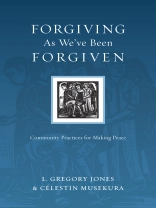Christians are supposed to forgive others as we've been forgiven. But hearing the call to forgive is different from knowing how to practice forgiveness at home and in the world. Forgiveness is about more than the isolated acts and words of individuals. To forgive and be forgiven, we need communal practices and disciplines for a way of life that makes for peace.Greg Jones and Célestin Musekura describe how churches and communities can cultivate the habits that make forgiveness possible on a daily basis. Following the Rwandan genocide, Musekura lost his father and other family members to revenge killings. But then he heard God tell him to forgive the killers. The healing power of forgiveness in his own life inspired him to work for forgiveness and reconciliation across Africa. Jones, author of Embodying Forgiveness, interacts with Musekura's story to show how people can practice forgiveness not only in dramatic situations like genocide but also in everyday circumstances of marriage, family and congregational life. Together they demonstrate that forgiving and being forgiven are mutually reciprocating practices that lead to transformation and healing.
สารบัญ
Series Preface
Before We Get Started . . .
1 The Heart of the Gospel
2 The Dance of Forgiveness
3 Putting On Christ
4 Healing the Wounds of Memory
5 Communities of Forgiveness
Study Guide
Acknowledgements
Notes
About the Duke Divinity School Center for Reconciliation
เกี่ยวกับผู้แต่ง
Célestin Musekura (Ph.D., Dallas Theological Seminary) is president and founder of African Leadership and Reconciliation Ministries (ALARM, Inc.), a ministry with African national staff training church and community leaders across East and central Africa in leadership, conflict resolution, forgiveness and tribal reconciliation. He spent six years pastoring in Rwanda and serving in administration with the Association des Eglises Baptistes au Rwanda. He cofounded the Sudan Evangelical Alliance to help the persecuted churches in southern Sudan unite in their suffering and in outreach to their nation. He is the author of An Assessment of Contemporary Models of Forgiveness.












